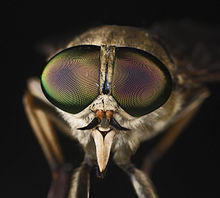Tabanus sudeticus
| Tabanus sudeticus | |
|---|---|
 | |
| Scientific classification | |
| Domain: | Eukaryota |
| Kingdom: | Animalia |
| Phylum: | Arthropoda |
| Class: | Insecta |
| Order: | Diptera |
| Family: | Tabanidae |
| Subfamily: | Tabaninae |
| Tribe: | Tabanini |
| Genus: | Tabanus |
| Species: | T. sudeticus |
| Binomial name | |
| Tabanus sudeticus | |
| Synonyms | |
Tabanus sudeticus, also known as the dark giant horsefly, is a species of biting horse-fly.[5][6] It is the heaviest fly in Europe.[7]
Description
[edit]The dark giant horsefly's length is around 20-25 millimeters.[8] They have uniform dark brown eyes.[8]
Dark giant horseflies are a common species to be found buzzing around cows and horses.[8] They usually only suck blood from those horses and cows, avoiding humans.[8] They fly with a very loud buzzing.[8][9]
Distribution
[edit]
Tabanus sudeticus is found in many countries of Western Europe. It has a marked northern and western distribution; being found as far north as southern Norway and the Western Isles of Scotland, and with an occasional record from Belarus.[10]
References
[edit]- ^ Zeller, P.C. (1842). "Dipterologische Beytrage. Zweyte Abtheilung". Isis (Oken's). 1842: 807–847.
- ^ Oldroyd, H. (1939). Tabanidae. In Edwards, F.W., Oldroyd, H. & Smart, J., British blood-sucking flies. Vol. 8. London. pp. 1–156.
{{cite book}}: CS1 maint: location missing publisher (link) - ^ a b c Goffe, E.R. (1931). "British Tabanidae (Diptera). With an account of the principal variation. With descriptions of a number of new forms, and of some additions to the British List". Transactions of the Entomological Society of the South of England. 6(1930): 43–114.
- ^ Verrall, G.H. (1909). Stratiomyidae and succeeding families of the Diptera Brachycera of Great Britain In his British flies. Vol. 5. London: Gurney & Jackson. pp. 780 pp. Retrieved 14 October 2022.
- ^ Moucha, J. (1976). "Horse-flies (Diptera: Tabanidae) of the World. Synoptic Catalogue" (PDF). Acta Entomologica Musei Nationalis Pragae Supplements. 7: 1–320. Retrieved 11 September 2022.
- ^ Stubbs, A. & Drake, M. (2001). British Soldierflies and Their Allies: A Field Guide to the Larger British Brachycera. British Entomological & Natural History Society. pp. 512 pp. ISBN 1-899935-04-5.
- ^ "Check out this massive fly". Naturenet. 7 June 2009. Retrieved 25 August 2020.
- ^ a b c d e THES, MoveCMS by. "Dark giant horsefly | Animal | Life Habitats". www.lifehabitats.com. Retrieved 2022-09-17.
- ^ Chvála, Milan; Lyneborg, Leif; Moucha, Josef (1972). The Horse Flies of Europe (Diptera, Tabanidae). Copenhagen: Entomological Society of Copenhagen. pp. 598pp, 164figs. ISBN 978-09-00-84857-5.
- ^ "Dark Giant Horse Fly Tabanus sudeticus". iNaturalist. Retrieved 10 June 2020.



 French
French Deutsch
Deutsch